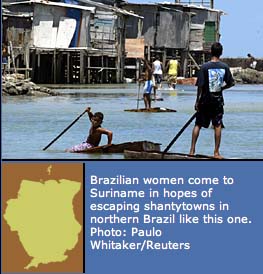Popular market and transit country for sex trade victims from Brazil and other Latin American countries.
Type: Destination and Transit Country
Background
Sex sells in Suriname. An impoverished population and anti-prostitution laws that go unenforced make this former Dutch colony a popular destination for sex industry traffickers. A 1997 UN report noted that Suriname is one of the few countries that also issues temporary work permits for migrant prostitutes allegedly en route to other countries. With 70 percent of the population living below the poverty line, parents struggling to survive have been known to sell their children in Suriname’s various gold mining towns, according to anti-slavery organizations. In all cases, the set-up story is similar: Promised a decent job as a waitress or other position, women unwittingly sign up with a trafficker for assistance in coming to Paramaribo or Suriname’s mining towns, only to find themselves caught in a trafficking ring upon arrival.
Victims
Government data on women in the Suriname sex industry is sparse. Clubs in the Surinamese capital, Paramaribo, reportedly do a brisk business recruiting women from Brazil, Colombia, Venezuela, Guyana, and the Dominican Republic. According to a recent UN report, traffickers can receive $500 from Suriname club owners for a Brazilian woman. Many hail from Brazil’s poor northern regions, where promises of a steady job as a waitress or construction worker exercise a powerful lure. Once sold to a club owner, however, the women themselves stand little chance of earning money to pay off so-called “debts” (for food, lodging, etc.) used to justify the deal. Internet sex guides put prices for Paramaribo’s prostitutes at $10 to $30 and report that “the girls” are often sent on to work in Amsterdam. Aside from Western Europe, the U.S. is also a popular destination for Chinese and Indian girls smuggled into the country. Club owners routinely hold the passports of purchased women until debts are repaid. Though the U.S. 2003 Trafficking in Persons report states that there is no society-wide pattern of child prostitution or trafficking in Suriname, the International Labor Organization (ILO) and previous U.S. State Department reports have indicated that the issue is of growing concern to government officials. Roughly 30 percent of the population is younger than 14 years old, a situation that makes juvenile street vendors, newspaper sellers, or shop assistants a common sight on the streets of Paramaribo, the ILO reports. For many, the transition to prostitution is seamless. ECPAT (End Child Prostitution and Trafficking) International, a nonprofit network that fights child prostitution, reports that parents strapped for cash increasingly bring their children into mining towns to work in the sex trade. The legal age of consent in Suriname is 21, but under a controversial Asian Marriage Law, it is much lower for Surinamers of Asian descent: 14 for boys, 13 for girls. Many Surinamers believe the chances of contracting HIV/AIDS from children are less high, ECPAT reports, making juvenile prostitutes an increasingly popular option.
Counter-Trafficking Efforts
Though the U.S. July 2003 Trafficking in Persons report described Suriname’s government as “indifferent” to trafficking, two months later the country was included among nine other countries for making “notable progress” in combating human trafficking. Prostitution is illegal in Suriname, but the police, according to the U.S. State Department report, often turn a blind eye to brothels, either acting as “advisors” to club and brothel owners or smoothing the way for migrant prostitutes to enter Suriname en route to other destinations. In other cases, police present themselves as honest brokers, holding airline tickets for women caught in disputes with brothels until the argument is resolved. A 2002 U.S. State Department Human Rights Country Report indicated that police claim they visit brothels twice a month to ensure that no woman is being held against her will or being abused, but do little to correct the situation of those found there.



